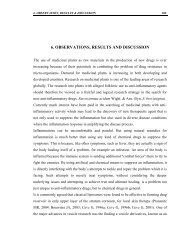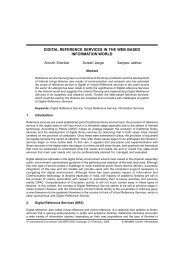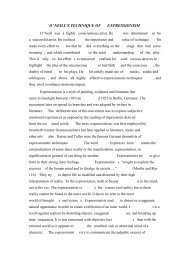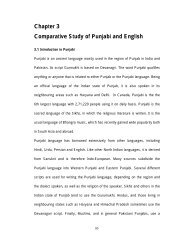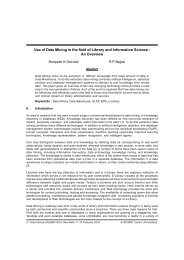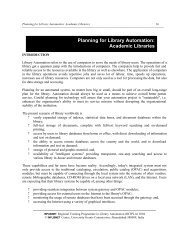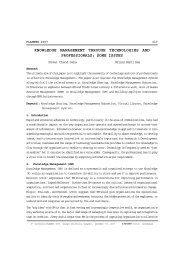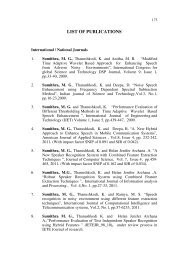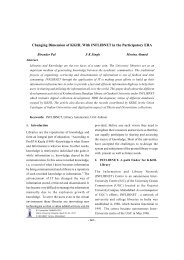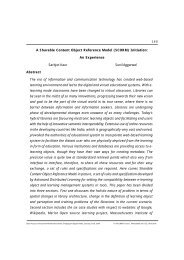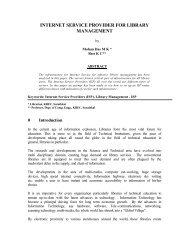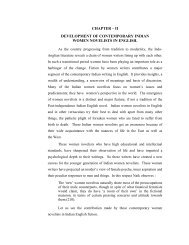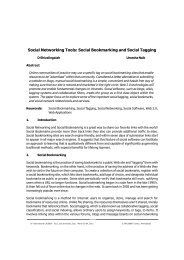consortium of plantation crops research libraries for resource sharing
consortium of plantation crops research libraries for resource sharing
consortium of plantation crops research libraries for resource sharing
You also want an ePaper? Increase the reach of your titles
YUMPU automatically turns print PDFs into web optimized ePapers that Google loves.
288<br />
CONSORTIUM OF PLANTATION CROPS RESEARCH LIBRARIES<br />
FOR RESOURCE SHARING – A PROPOSAL<br />
ISSUES AND FACTS<br />
Abstract<br />
Govind Joshi<br />
In<strong>for</strong>mation explosion resulted from the rapid advances in all scientific fields has made it<br />
vital <strong>for</strong> all scientists to have rapid, easy access to scientific in<strong>for</strong>mation. However, scientists<br />
in developing countries are hampered by the high cost <strong>of</strong> subscriptions to various journals.<br />
Since air-mail delivery is prohibitively expensive, the journals that are received come six to<br />
eight months after the publication date, hampering the work <strong>of</strong> scientists even further.<br />
Fortunately, the Internet has come to the rescue. Online journals are available immediately<br />
after publication anywhere in the world, with a few clicks <strong>of</strong> a mouse. Electronic subscriptions<br />
are normally cheaper than print subscriptions. Nevertheless, the costs to institutions are<br />
still extremely high, particularly in view <strong>of</strong> the fact that any institution has to subscribe to<br />
many journals to meet the varied needs <strong>of</strong> its scientists. In view <strong>of</strong> this urgent need, it is<br />
proposed that all institutions dedicated to <strong>research</strong> on <strong>plantation</strong> <strong>crops</strong> come together to<br />
<strong>for</strong>m a <strong>consortium</strong> to subscribe to a core group <strong>of</strong> international journals, available online,<br />
that would benefit all members. This would follow the pattern <strong>of</strong> other consortia such as<br />
INDEST, INFONET and INFLIBNET. Experience gained in an initial experiment are focused.<br />
Keywords :digital library; library <strong>consortium</strong>; <strong>plantation</strong> <strong>crops</strong>; <strong>resource</strong> <strong>sharing</strong>; e-journal<br />
<strong>consortium</strong>; INDEST Consortium; INFONET; INFLIBNET; FORSA; HELINET; ICARNET;<br />
Consortium <strong>for</strong> IIMs; ISRO Initiative<br />
1. INTRODUCTION<br />
Socio-economic and academic development is dependent on <strong>research</strong> which in turn is dependent upon<br />
availability <strong>of</strong> in<strong>for</strong>mation <strong>resource</strong>s. A clear distinction can be made among developed and developing<br />
nations on the basis <strong>of</strong> their in<strong>for</strong>mation richness. There still exists a clear East-West divide among the<br />
nations in this aspect. Libraries are the repositories <strong>of</strong> knowledge and knowledge is in<strong>for</strong>mation in<br />
different <strong>for</strong>ms. With the escalating cost <strong>of</strong> journals and periodicals, which are considered carriers <strong>of</strong><br />
in<strong>for</strong>mation or knowledge, many <strong>libraries</strong> have had to cut down their subscription to in<strong>for</strong>mation sources<br />
like the journals, databases etc. thus seriously affecting <strong>research</strong> and developmental activities. The<br />
concept <strong>of</strong> <strong>consortium</strong> approach in subscription to journals and databases has come as a boon to library<br />
and in<strong>for</strong>mation centers all over the world.<br />
Consortia-based subscription to journals and databases is the ideal solution in a situation where funds<br />
are scarce. It is a win-win situation where publishing agencies and participating library/in<strong>for</strong>mation<br />
centers/institutes work in a coordinated manner and the <strong>libraries</strong> deriving maximum benefit in <strong>sharing</strong><br />
the <strong>resource</strong>s. Interested readers are urged to look up the savings resulting from membership in the<br />
INDEST <strong>consortium</strong> (1).<br />
2. MATERIALS AND METHODS<br />
The various departments <strong>of</strong> the Tea Research Association (TRA) at its main laboratories at the Tocklai<br />
Experimental Station were asked to submit a list <strong>of</strong> international journals, available through on-line<br />
3 rd Convention PLANNER -2005, Assam Univ., Silchar, 10-11 Nov., 2005 © , Ahmedabad
subscription, that they would ideally like the library to provide <strong>for</strong> them. Interestingly, though the departments<br />
were asked to provide a list <strong>of</strong> three or four journals, most departmental lists had eight to ten journals,<br />
greatly highlighting the eager desire <strong>for</strong> access to the latest scientific in<strong>for</strong>mation. Letters soliciting<br />
experience, advice and suggestions regarding <strong>for</strong>ming <strong>of</strong> a <strong>consortium</strong> were sent to nearly 20 <strong>research</strong>/<br />
special librarians, Heads <strong>of</strong> Library and In<strong>for</strong>mation Services/Directors.<br />
3. RESULTS<br />
A list <strong>of</strong> journals, the cost <strong>of</strong> online subscription and the requesting department are listed in table 1. [It<br />
may be noted that “Service” refers to a catchall division that includes laboratories <strong>for</strong> soil, heavy metal and<br />
pesticide residue analysis.] It can be seen that the “wish list” is large, with the requirements <strong>of</strong> some<br />
departments overlapping. As is <strong>of</strong>ten the case with surveys, some “respondents” do not respond! In this<br />
case, three departments did not give their requirements. Even so, if the wish list were completely fulfilled,<br />
the annual cost to the institution would be Rs. 12,29,040 (taking 1 US$ = Rs. 47, 1£ = Rs.85 and1 € = Rs.<br />
57). If the silent departments added their requirements, this amount may well cross Rs. 15 lakhs. This is<br />
<strong>for</strong> an institute that focuses on a single <strong>plantation</strong> crop. Institutes with more than one crop in its purview<br />
will clearly need to subscribe to more journals. Also, the subscription list does not include the various<br />
Indian journals (and in the case <strong>of</strong> tea, those published by other developing countries such as Sri Lanka<br />
or Kenya). Indian journals are relatively low-cost and most institutions can af<strong>for</strong>d to subscribe to them.<br />
TRA obtains many journals from sister tea <strong>research</strong> institutes around the world on an exchange basis.<br />
Clearly, no single institution can af<strong>for</strong>d to subscribe to all the necessary journals at their actual cost. This<br />
compels us to bring up the idea <strong>of</strong> a <strong>consortium</strong> <strong>of</strong> all institutes and allied institutions that could join<br />
hands to subscribe at reduced rates to a group <strong>of</strong> journals that are <strong>of</strong> interest to the majority. The<br />
<strong>consortium</strong> can then negotiate <strong>for</strong> “group rates” with major publishing houses. Alternatively, the concerned<br />
ministry <strong>of</strong> the Government <strong>of</strong> India, in this case the Ministry <strong>of</strong> Commerce and Industry, can underwrite<br />
some proportion <strong>of</strong> the subscription or negotiate directly with publishers <strong>for</strong> a rate <strong>for</strong> the <strong>consortium</strong> as<br />
a whole, with the members paying some part <strong>of</strong> the costs. Of the 20 special librarians, only 3 responded<br />
promptly sending their “wish list” <strong>of</strong> journals. Table 2.<br />
Table 1. “Wish list” <strong>of</strong> journals given by scientists at TRA<br />
289<br />
Journal Cost Department(s)<br />
Agricultural Water Management $335 Technology Transfer (TT)<br />
Agronomy Journal $50 Agronomy, TT<br />
Applied Microbiology and Biotechnology € 3,500 Mycology<br />
Bio<strong>resource</strong> Technology n.a. Service<br />
Chemical Health and Safety n.a. Service<br />
Comm. Soil Science and Plant Analysis n.a. Service<br />
Crop Science $600 Agronomy, T0054<br />
Current Microbiology $765 Mycology<br />
EMBO Journal $144 Biotechnology<br />
European J. Clinical Microbiology & Infectious Diseases € 440 Mycology<br />
European Journal <strong>of</strong> Soil Science £222 Service, Soils, TT<br />
Food Science and Technology-LWT $534 Biochemistry<br />
Functional and Integrative Genetics € 110 Mycology<br />
Genome $129 Biotechnology<br />
ICID Bulletin- Irrigation, Drainage & Flood Control $30 Technology Transfer
290<br />
International Microbiology € 285 Mycology<br />
Irrigation & Drainage System $80 Technology Transfer<br />
J Agric Science [UK] $630 Agronomy, TT<br />
J. Agricultural and Food Chemistry $75<br />
J. Agronomy & crop Science £630 Agronomy. Soils, Service, TT<br />
J. Environmental Quality n.a. Service<br />
J. Industrial Microbiology & Biotechnology € 900 Mycology<br />
J. Irrigation and Drainage $110 Technology Transfer<br />
J. Microbiology. & Biotechnology $120 Mycology<br />
J. Natural Products $60 Biochemistry<br />
J. Plant Nutrition $1,295 Agronomy<br />
J. Science <strong>of</strong> Food and Agriculture n.a. Biochemistry<br />
Molecular Breeding n.a. Biotechnology<br />
Nucleic Acid Research $2,450 Biotechnology<br />
Phytochemistry $4,172 Biochemistry<br />
Plant and Soil n.a. Service, Soil<br />
Total cost Rs. 1229040<br />
*n.a. price not available on journal/publisher’s web site<br />
Table 2. List <strong>of</strong> Special/Research Libraries<br />
• Tea Research Foundation, UPASI, Valparai, Tamil Nadu<br />
• Indian Society <strong>for</strong> Plantation Crops, Kasargod, Kerala<br />
• Indian Society <strong>for</strong> Spices, Kozhikode, Keralaarch, Kasargod, Kerala<br />
• Society <strong>for</strong> Promotion <strong>of</strong> Oil Palm Research and Development, Pedavegi,A .P.<br />
• Central Plantation Crops Research Institute, Kasargod, Kerala<br />
• Rubber Research Institute, Kottayam, Kerala<br />
• Central C<strong>of</strong>fee Research Institute, Chikamagalur, Karnataka<br />
• Coconut Development Board, , Kochi, Kerala<br />
• Indian Cardamom Research Institute, Myladumpara, Kerala<br />
• National Research Centre <strong>for</strong> Cashew, Puttur, Karnataka<br />
• National Research Centre <strong>for</strong> Oil Palm, Pedavegi, A. P.<br />
• Indian Council <strong>of</strong> Agricultural Research, New Delhi<br />
• Darjeeling Tea Research and Development Centre, Darjeeling, West Bengal<br />
• Institute <strong>of</strong> Himalayan Bio<strong>resource</strong> Technology, Palampur, Himachal Pradesh<br />
• Regional Research Laboratory, CSIR, Jorhat, Assam<br />
• Assam Agricultural University, Jorhat, Assam<br />
• Rain Forest Research Institute, Jorhat, Assam<br />
• Central Muga Eri Research & training Institute, CSB, Jorhat, Assam<br />
• University <strong>of</strong> North Bengal, Raja Rammohunpur, West Bengal
291<br />
4. DISCUSSION<br />
The following are some examples <strong>of</strong> consortia fully operational at present in the country.<br />
1. INDEST [Indian National Digital Library in Engineering, Science and Technology]: INDEST was/is<br />
set up by the Ministry <strong>of</strong> Human Resources Development, Government <strong>of</strong> India [MHRD, G.O.I.].<br />
The Ministry provides funds to some 38 institutions <strong>of</strong> higher education which come under the<br />
purview <strong>of</strong> the Ministry/UGC / AICTE and to some other private institutions. INDEST is operating<br />
from its Head Quarters at IIT, Delhi campus. [1].<br />
2. INFONET and E-JOURNAL: These are the two consortia launched by the University Grants<br />
Commission [UGC] to promote the use <strong>of</strong> full-text journals and electronic databases by the <strong>research</strong><br />
and academic community in the country. The programme is wholly funded by the UGC and all<br />
universities, which come under the purview <strong>of</strong> the UGC, will be members <strong>of</strong> the programme. This<br />
programme is being executed by In<strong>for</strong>mation and Library Network [INFLIBNET] Center, Ahmedabad<br />
3. E- JOURNAL CONSORTIUM OF CSIR: NISCAIR [National Institute <strong>of</strong> Science Communication and<br />
In<strong>for</strong>mation Resources], <strong>for</strong>merly INSDOC, is the nodal agency <strong>for</strong> developing the <strong>consortium</strong> <strong>for</strong><br />
CSIR laboratories <strong>for</strong> accessing electronic journals and databases. The activities <strong>of</strong> NISCAIR<br />
range from creation to maintaining <strong>of</strong> access facilities <strong>of</strong> scientific periodicals published by leading<br />
international institutions. The objectives as stated in their policy document are:<br />
“To strengthen the pooling, <strong>sharing</strong> and electronically accessing the CSIR library <strong>resource</strong>s.<br />
“To provide access to world S & T literature to CSIR laboratories.<br />
“To nucleate the culture <strong>of</strong> electronic access resulting into evolution <strong>of</strong> digital <strong>libraries</strong>.” [3].<br />
4. FORSA [ Forum <strong>for</strong> Resource Sharing in Astronomy and Astrophysics] Established in 1981 is the<br />
earliest example <strong>of</strong> <strong>consortium</strong> <strong>for</strong> <strong>sharing</strong> <strong>resource</strong>s. At present FORSA have eleven members<br />
from different government departments, DST, UGC, DAE etc. and the number is growing every<br />
year.[9]<br />
5. HELINET : A shared budget model <strong>consortium</strong> to cater to Health Libraries and In<strong>for</strong>mation Network.<br />
6. ICARNET : Consortium <strong>of</strong> Indian Council <strong>of</strong> Agricultural Research <strong>libraries</strong> network is being<br />
developed.[9]<br />
7. CONSORTIUM For IIMs : Six Indian Institute <strong>of</strong> Management have <strong>for</strong>med a <strong>consortium</strong> <strong>for</strong><br />
subscribing to and <strong>resource</strong> <strong>sharing</strong> in the area <strong>of</strong> management , social and behavioral science<br />
journals and databases. [8]<br />
8. ISRO Initiatives : The <strong>resource</strong> <strong>sharing</strong> initiative taken by Indian Space Research Organisation<br />
<strong>libraries</strong> are expected to result in savings <strong>of</strong> Rs. 41 lakhs per year by way <strong>of</strong> avoiding duplication <strong>of</strong><br />
journal and database subscription. [8<br />
The objectives <strong>of</strong> the INDEST, INFONET and E-JOURNAL consortia, FORSA, ICARNET, HELINET, IIM<br />
Consortium, ISRO Initiatives are similar to those <strong>of</strong> NISCAIR’s. It is interesting to note that while a<br />
number <strong>of</strong> similar consortia are coming up/being <strong>for</strong>med, agriculture and <strong>plantation</strong> sector do not yet<br />
have any such <strong>consortium</strong> <strong>of</strong> <strong>libraries</strong> and in<strong>for</strong>mation centers <strong>for</strong> <strong>resource</strong> <strong>sharing</strong>. Some <strong>of</strong> the <strong>plantation</strong><br />
institutions coming under the Ministry <strong>of</strong> Agriculture / Indian Council <strong>of</strong> Agricultural Research utilize the<br />
<strong>resource</strong>s <strong>of</strong> NICNET [National In<strong>for</strong>matics Center Network]. NICNET provides access to some databases<br />
all <strong>of</strong> which are not totally useful <strong>for</strong> <strong>plantation</strong> <strong>crops</strong> <strong>research</strong>ers.
Table 1 (above) lists some <strong>of</strong> the important core journals which are essential <strong>for</strong> <strong>research</strong> scientists to<br />
keep them abreast with developments in their respective areas. The list is not exhaustive but only<br />
indicative and has been compiled on the basis <strong>of</strong> in<strong>for</strong>mation provided by the respective TRA departments.<br />
It is interesting to note that the existing consortia do not cover most <strong>of</strong> these journals. It can be inferred<br />
that since the areas <strong>of</strong> <strong>research</strong> prevalent in most <strong>of</strong> the <strong>plantation</strong> <strong>crops</strong> institutes are similar to that <strong>of</strong><br />
TRA, the same set <strong>of</strong> journals and, in some cases, many more will be necessary.<br />
W hile non-conventional <strong>crops</strong>/plants are continuously being added to the traditional list the major<br />
<strong>plantation</strong>s <strong>crops</strong> that are grown in the Indian sub-continent are: tea, c<strong>of</strong>fee, cardamom, cashew, rubber,<br />
cocoa, areca nut, coconut, oil palm, palmyrah, and spices which include more than 63 <strong>crops</strong> including<br />
black pepper, cinnamon, nutmeg, cloves, smilax, allspice, vanilla, curry leaf, chillies, celery, turmeric,<br />
ginger, fennel, fenugreek etc. None <strong>of</strong> the existing consortia is suitable <strong>for</strong> most/all <strong>of</strong> these institutes;<br />
hence there is a need <strong>for</strong> a separate <strong>consortium</strong> <strong>for</strong> the <strong>plantation</strong> <strong>crops</strong> <strong>research</strong>.<br />
It is, there<strong>for</strong>e, suggested that <strong>libraries</strong> <strong>of</strong> the institutions listed below join hands to <strong>for</strong>m the<br />
5. CONSORTIUM OF PLANTATION CROPS LIBRARIES<br />
• Tea Research Association,Tocklai Experimental Station, Jorhat<br />
• Tea Research Foundation UPASI, Valparai<br />
• Indian Society <strong>for</strong> Plantation Crops, Kasaragod<br />
• Indian Society <strong>for</strong> Spices, Kozhikode<br />
• Indian Institute <strong>of</strong> Spices Research, Kasargod<br />
• Society <strong>for</strong> Promotion <strong>of</strong> Oil Palm Research and Development [SOPOPROD]<br />
• Central Plantation Crops Research Institute, Kasargod<br />
• Rubber Research Institute , Kottayam<br />
• Central C<strong>of</strong>fee Research Institute, Chikamagalur<br />
• Coconut Development Board, Kochi<br />
• Indian Cardamom Research Institute, Myladumpara<br />
• National Research Center <strong>for</strong> Cashew, Puttur<br />
• National Research Center <strong>for</strong> Oil Palm, Pedavegi<br />
• Indian Council <strong>of</strong> Agricultural Research, New Delhi[4-7].<br />
Membership <strong>of</strong> the <strong>consortium</strong> can be open to any other interested group/organisation.<br />
The disciplines covered by each one <strong>of</strong> these institutes are basically similar. It is hoped that all who read<br />
this article will share the views <strong>of</strong> the author. It is interesting to note that the concept <strong>of</strong> Consortium is not<br />
altogether new to library pr<strong>of</strong>ession. Co-operation among <strong>libraries</strong> is as old as modern librarianship.<br />
Consortium simply put is co-operation <strong>for</strong> one or the other objective. Despite the success stories <strong>of</strong> many<br />
<strong>of</strong> the leading consortia that are operating in India, the Consortium movement is yet to catch up with the<br />
new generation librarians.<br />
292
293<br />
6. REFERENCES<br />
1. www.paniit.iitd.ac.in/indest-brochure <strong>for</strong> core members [web accessed on 24.8.2004 at 3.40 p.m.]<br />
2. www.inflibnet.ac.in [website accessed on 24.8.2004 at 4 p.m.]<br />
3. www.niscom.res.in [website accessed on 24.8.2004 at 3.16 p.m.]<br />
4. www.iisr.org/Indian Institute <strong>of</strong> Spices Research/Bioin<strong>for</strong>matics Center established under the<br />
BTISNet <strong>of</strong> Dept. <strong>of</strong> Biotechnology, G.o.I.[website accessed on26.8.2004 at 3.04 p. m]<br />
5. www.rubberboard.org.in/rubber<strong>research</strong>institute.asp-Rubber Research Institute <strong>of</strong> India/Rubber<br />
Board <strong>of</strong> India/Library collection[website accessed on 26.8.2004 3.15 p. m.]<br />
6. www.coconutboard.nic.in -[website accessed on 26.8.2004 at 3.21 p. m.]<br />
7 Plantation Crops Research and Development in the New Millennium.PLCAROSYM XIV , 12-15<br />
Dec. 2000, Ed. By P. Rethinam et al.<br />
8 Goudar, I.R.N; Narayana, Poornima. 2004. Emerging pricing models <strong>for</strong> E-journals consortia and<br />
Indain initiatives. In ICDL 2004, International Conference on Digital Libraries, New Delhi 42-27<br />
February 2004. Vol. I : Pp333-339.<br />
9. Sreekumar, M G. 2004. Long term preservation <strong>of</strong> scholarly <strong>resource</strong>s : some prescriptions <strong>for</strong> the<br />
IIM Consortium. In DRTC-INDEST-[IIT , Delhi]-USEFI Joint symposium on Consortia Approach to<br />
Resource Sharing : Issues and Policies. 6-8 th October 2004, ISI/DRTC Bangalore . Paper. I<br />
About Author<br />
Govind Joshi, BSc, MLibSc, PG-DPM, is a pr<strong>of</strong>essional librarian working in the<br />
Library <strong>of</strong> Tea Research Association’s Tocklai Experimental Station at Jorhat,<br />
Assam over two-and –a-half decades. He has created a number <strong>of</strong> bibliographic<br />
databases in Tea Science and Technology such as Tea Science Database,<br />
Documentation in Tea Science, Tea Patents Database, Database <strong>of</strong> Doctoral<br />
Dissertations in Tea Science, Tea Standards Database, Database <strong>of</strong> Free Journal<br />
Resources on the Internet etc. He has authored three papers. Life Member <strong>of</strong><br />
IASLIC, [Kolkata], ILA[New Delhi], and Special Member, JLA[ Jorhat Library<br />
Association] Jorhat. He is also Nodal Officer <strong>of</strong> International Society <strong>for</strong> Tea<br />
Science [ISTS], New Delhi <strong>for</strong> Link Institutional Cooperation.<br />
Email : govinda_joshi1@yahoo.com or tratjorh@sancharnet.in




